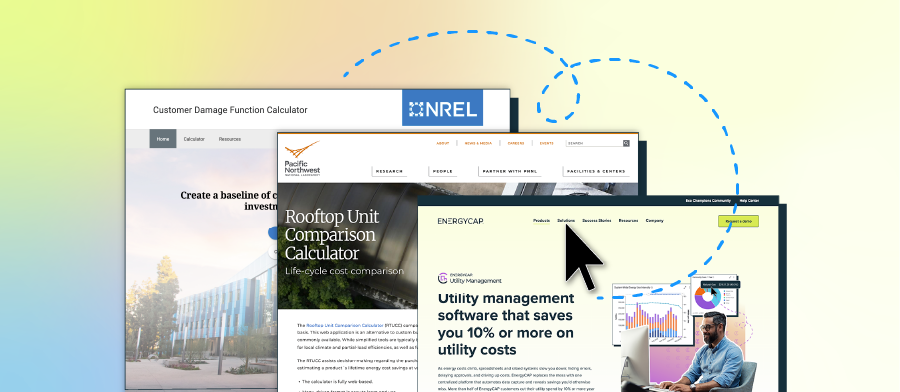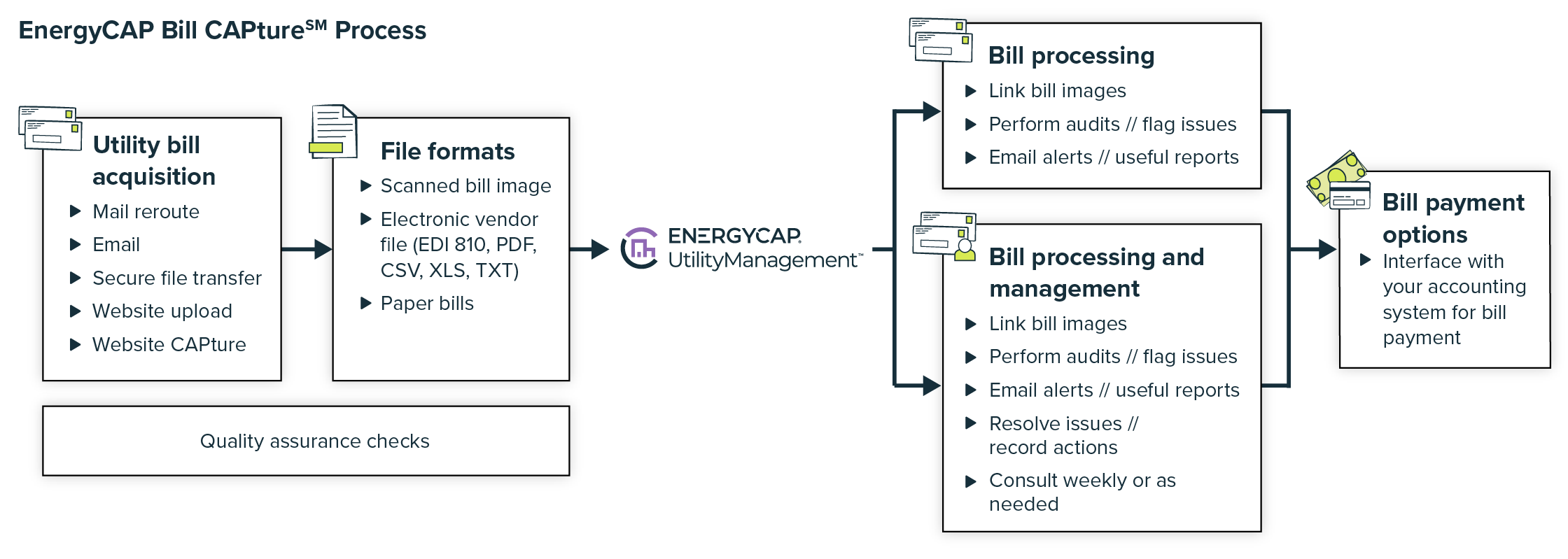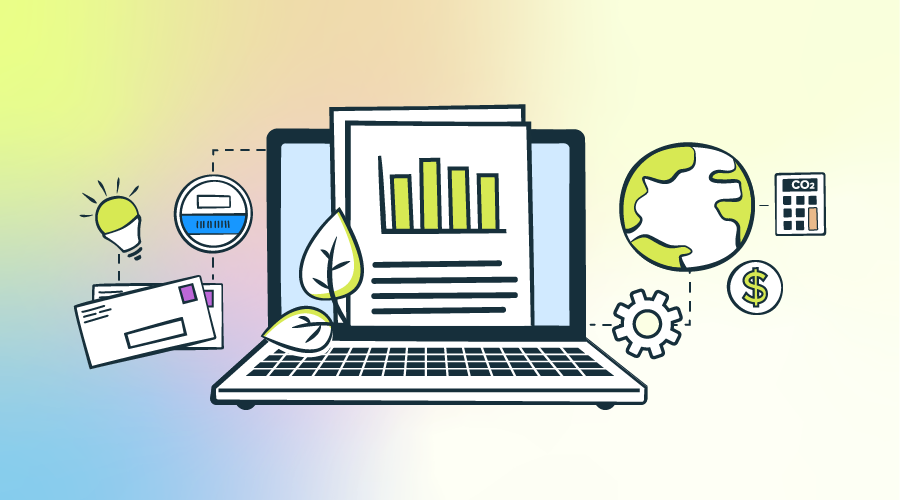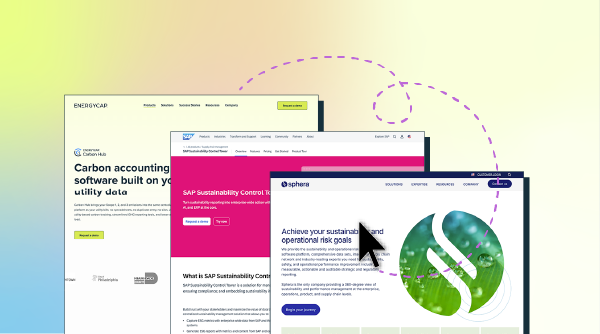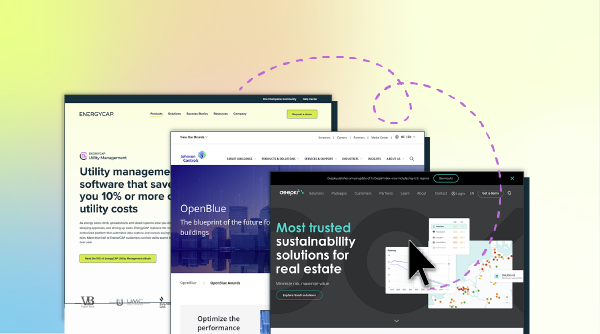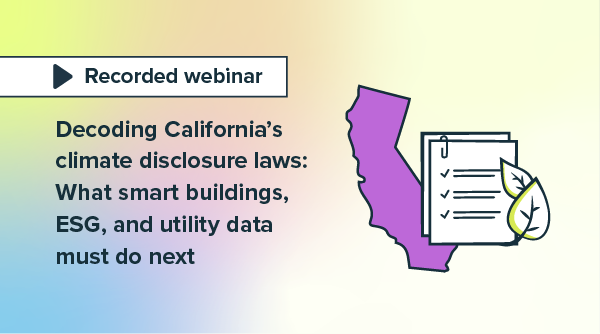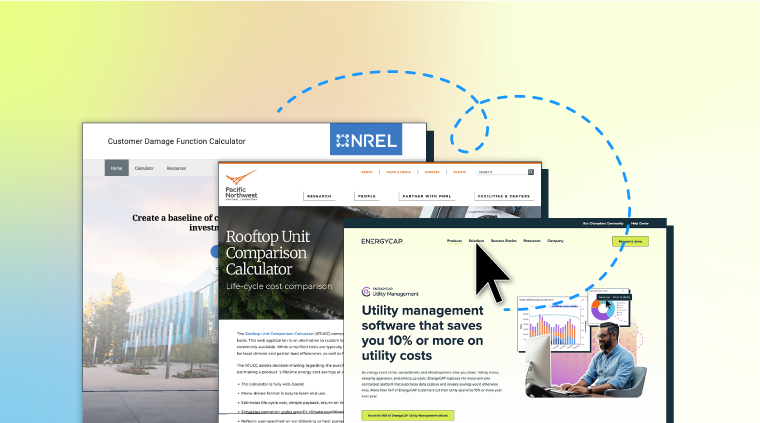Why use EnergyCAP’s implementation services?
Often, today’s software tools are geared toward allowing users to implement and maintain the application independently. That’s true of our EnergyCAP application. We provide more tools than ever to allow users to integrate our application with their accounting, metering, BAS, and other platforms. We give our users the means to easily import and export data, to slice and dice data for reporting, and to configure views and dashboards to support their unique workflows. With all these tools at our customers’ disposal, why engage ENC’s project management team?
Answer: There is simply no replacement for experience. Due to our experience, our implementation team can address common challenges and propose creative solutions for uncommon challenges. Following are some examples:
Size, Scope, and Siloes
Energy management and utility bill accounting functions span the entire enterprise, touching numerous departments, processes, and functions, often with disparate leadership, goals, and obstacles. Our project managers bring a global view to your implementation project. The EnergyCAP project manager brings the disparate and sometimes siloed data into a single vision and serves as a neutral third party, bringing objectivity and experience to address challenges that inevitably arise with complex, cross-departmental cooperation.
Legacy Issues
A question we often discuss with customers who are weighing the value of our implementation services is, “How long did it take for your data to get in its current state?” For almost every user, energy and utility bill data management evolve as needs and circumstances change…a new building here, a new metering system there. As in Darwin’s theory of evolution, some species thrive, a lot of them go extinct, and some of them linger on, perhaps long after they should. When customers think about the many lines of their energy data management evolution, among many departments, there may be decades of data and processes to unravel in order to arrive at an intelligent design.
Our implementation team specializes in helping our customers distill a legacy of data down into relevant, organized, and future-facing information.
Breadth and Depth of Expertise
When it comes to implementing enterprise-level software, there is a lot to know. The most experienced energy manager may not possess deep knowledge of utility bill accounting. A leader in the accounting department may be unfamiliar with the best practices for cost avoidance (M&V) calculations. And, neither of these folks may bring the development experience to bear to automate the processes that will streamline their workflows. Implementation requires a team approach, and EnergyCAP’s team can handle all facets of your project.
The EnergyCAP Implementation Team:
| ENC Roles | Responsibilities |
| Project Manager | - Project lead
- Overall point of contact
- Manage project: ensure deliverables are reviewed and approve in timely manner
- Facilitate communication
|
Senior Project Manager &
PM Team Lead | - Assist lead project manager
- Secondary point of contact
|
| Project Engineer | - Support project management team
- System configuration and data manipulation
- Development, automation, and integration testing
|
| Chief Project Officer, Project Management Office | - Supervise project managers
- Resolve issues that may arise
- Ensure quality
|
| Bill CAPture Specialist | - Leads Bill CAPture enrollment process
- Primary point-of-contact for ongoing bill processing
- Manages vendor accounts (optional)
|
| Sales Account Manager | - Lead point of contact for all matters specific to client account
- Assist with high severity level requests or issue escalations as required
|
How is implementation priced?
The ERP implementation fee is based primarily on expected labor hours, and perhaps not surprisingly, experience. Experience is the difference when it comes to estimating the time and level of effort required for a successful implementation. With hundreds of successful software implementations under our belts, we’ve come to learn what works, what doesn’t, and how to spot problems before they take root.
In order to determine the level of effort and timeline for an implementation project, we draw on insights from our history of implementation projects. EnergyCAP sales representatives work with each customer to determine which software features, integrations, and services are appropriate for their respective organizations. With this information in hand, the EnergyCAP representative then works with our Project Management Office to compare past projects with the current client’s needs and attributes. Using historical averages and expected nuances, the teams will then budget the time and resources required to successfully implement your EnergyCAP solution.
How long does it take?
On average, a full ERP implementation project requires 6–12 months to complete. Timelines vary widely with project size and scope, and the EnergyCAP representative provides a detailed timeline with milestones and definitions of ENC and client responsibilities. The duration of the project is most impacted by the client’s ability to provide information and make decisions.
How does EnergyCAP integrate with our other platforms?
The ENC project manager may offer multiple options for integrating EnergyCAP with metering, BAS, accounting, and other platforms. The best method for integration depends on the capabilities of the platform with which we’re integrating EnergyCAP and the customer-specific goals for the integration. In most cases, the best path forward for integration boils down to a handful of questions:
How is data made available from the platform?
In the vast majority of cases, EnergyCAP integrates interval or accounting data via file transfers from metering or BAS/BMS or AP/GL systems. These systems generally write data to an intermediary file format, like XLS, which can be imported into EnergyCAP. In some cases, the platform may not write data into an acceptable format, or the client may prefer a tighter integration of systems. In these instances, the project manager may recommend integrating EnergyCAP’s API with APIs offered by the metering or accounting platform. API-based integrations require technical expertise to implement and may extend the implementation schedule a bit, but they offer a high level of stability and reliability.
What does the data look like?
In some cases, data coming from metering platforms for ingestion into EnergyCAP or data flowing from EnergyCAP to accounting is well formatted for import. When this happens, the level of integration effort will be less than or close to our historical averages. In other cases, interval and accounting data may not be closely aligned to the import format required by EnergyCAP or other systems. In this latter scenario, ENC’s implementation team can write an intermediary application to reformat the data and save it in a format that is import-ready. Creating a reformatter may add implementation time and effort, but the payback period is typically short due to increased workflow efficiency and improved data reliability and accuracy.
How will meter data be imported into EnergyCAP and how often will imports occur?
Once meter data is available and in an importable format, we’re ready to bring it into the EnergyCAP application. EnergyCAP supports the manual import of data through the user interface by leveraging our Interval Data Import Formats, which allow for straightforward mapping of spreadsheet files to fields in the EnergyCAP database.
When users have hundreds or thousands of interval data files generated each day, manual imports of data prove unrealistic. To support the upload of interval data at scale, our implementation staff write automation routines to pick up and automatically import interval data at regular intervals. Clients determine the interval at which EnergyCAP automatically imports meter data. For most, a nightly import of data is sufficient, while other users require more frequent imports, every 30 or 15 minutes, for example.
Common pitfalls
While ENC boasts an impressive record of delivering implementation projects on time and on budget, we encounter some challenges on the path to success. Below are some common obstacles that may be helpful to anticipate when preparing your organization for the implementation process.
Non-standard Standards
Since EnergyCAP has integrated its platform with so many metering, BAS, and accounting platforms, it seems reasonable to assume that we can simply duplicate the steps for each system whenever we encounter a system we’ve worked with before. The reality is, however, that each integration is unique. Standard formats, as defined in different platforms’ documentation, can be anything but standard, with configurations as unique as the organizations we serve. That’s why we spend significant time and energy in the scoping process—to go beyond how systems are supposed to work and gain an understanding of how things truly work (or should work) in your organization.
Whose job is it, anyway?
Since EnergyCAP’s utility spans so many disciplines and departments, it’s sometimes difficult to know who “owns” the implementation project within our clients’ organizations. History shows us that delays on the client side pose the biggest risk to your project timeline and budget. Customers should expect that their internal project manager will be as engaged and involved in the day-to-day management of their EnergyCAP implementation as ENC’s team. Prompt decisions and honest, thorough feedback drive the timeliness and quality of the implementation project.
Below are client-side roles that are typically filled in successful EnergyCAP implementation projects.
| Customer Roles | Responsibilities |
| Project Sponsor | - Approve project start
- Approve project change orders as necessary
- Approve or delegate approval that project has been completed satisfactorily
|
| Project Manager | - Primary point of contact
- Manage project: ensure deliverables are reviewed and approved in timely manner
- Ensure critical success factors are identified, validated, and approved
- Facilitate communication
|
| IT Support | - Ensure infrastructure and data requirements are identified and completed
- Provide technical expertise
- Install systems and software
|
| Accounting Support | - Understand accounting and workflow functions of system
- Provide expertise on accounting codes and structure of data
- Provide interface specifications (as required)
|
| Additional Support | - Identify and approve reporting requirements
- Conduct testing via scenarios and ad-hoc
- Provide feedback and sign off on key deliverables
|
Hidden Scope
While EnergyCAP’s staff makes every effort to extract all relevant scope details before the project begins, it’s not uncommon for new information to come to light during the implementation project. Very often, stakeholders whose needs for reporting, workflows, organization schemes, and the like may introduce new requests after the project has begun. We make every effort to accommodate our clients’ needs within the allotted schedule and budget, and we will be happy to provide a change order and a project rate to deliver on the expanded scope. That said, to maintain a budget and timeline, it’s always best to ensure that any potential stakeholder interests are represented in the initial scoping process. In short, ask for input among expected ERP users early in the process, and emphasize the importance of agreeing on the scope prior to implementation project kick-off.



![Top 12 sustainability reporting platforms (ESG) [2026]](https://www.energycap.com/wp-content/uploads/2025/12/blog_article_top-sustainability-platforms.webp)

